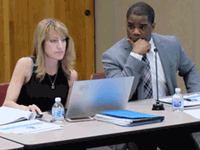[
{
"name": "500x250 Ad",
"insertPoint": "5",
"component": "15667920",
"parentWrapperClass": "",
"requiredCountToDisplay": "1"
}
]
Same-sex marriage has become an issue, at least for the moment, in the presidential campaign. We may never know what George Bush, John Edwards, and John Kerry really think: The topic is so emotional that its mere mention forces a political stance.
Attitudes will change. Years from now, same-sex marriage will be no more controversial in the mainstream public as interracial marriage is today.
Meantime, though, there is the reality of the current debate. The president has called for a constitutional amendment that would deny rights, when the nation's history is one of seeking to protect rights. An amendment, says the New York Times, "would inject meanspiritedness and exclusion into the document embodying our highest principles and aspirations."
And yet, if we believe the polls, the majority of Americans oppose same-sex marriage. There, outside the political arena, is where there is work to do.
The work will not be easy. "The arguments given by those opposed to granting same-sex couples the right to marry are rooted in their hearts," writes a California lesbian couple dear to my family.
The president, like the supporters who pushed him into this public stand, insists that America needs a constitutional amendment to protect marriage. But it is not the union of same-sex couples that puts marriage under stress.
Financial problems, alcoholism and other illnesses, long periods of separation caused by careers or military service, a hasty marriage... husband and wife maturing and simply growing in different directions... the physical attraction of someone other than a marriage partner....
Any of these can cause a marriage to break apart. And banning same-sex marriage will not affect a one of them.
(Maybe we should have a constitutional amendment banning divorce. Maybe we should have a constitutional amendment prohibiting unmarried heterosexual couples from living together.)
The concern over the stability of marriage is a legitimate one, to the degree that marriage does provide a secure, stable environment for married couples and for their children. But many marriages do not provide stability, for anyone. Many marriages are a nightmare.
And countless single parents, through Herculean effort and devotion, manage to provide a stable home life and raise happy, productive children.
If it is stable relationships and healthy marriages that the president seeks, there are more meaningful avenues to pursue --- providing a living wage, health care, and job security among them.
The proposed constitutional amendment is not about stable relationships, of course. Single-sex marriage would promote stable relationships, not undermine them. The proposed constitutional amendment is about discrimination. It is about denying to gays and lesbians rights that are afforded to heterosexuals. It is about insuring that gays and lesbians remain second-class citizens.
The discrimination comes from a fear and a prejudice that can not be eradicated by a constitutional amendment or the words of a president or presidential candidate. That fear and prejudice, as my lesbian friends in California have said, come from the heart. It will be changed only through education and understanding, and through personal experience, through acquaintance with openly gay, lesbian, bisexual, and transgendered Americans.
While we wait for the spread of understanding, people whose sexual orientation is not heterosexual will continue to suffer the effects of discrimination and hatred. Permitting same-sex couples to marry is the least we can do.
Politicians are in a trap on this issue. Those of us not in that trap have a duty to speak out.
The program, from 7 to 9 p.m. in St. John Fisher's Kearney Auditorium, is hosted by Representative Louise Slaughter and Federal Communications Commissioner Jonathan Adelstein. They'll both be on the program, as will I, WXXI's Norm Silverstein, and Richard Greene, owner of WLVL independent radio in Lockport.
An estimated two-thirds of newspaper markets in the United States are served by monopolies. (The Rochester-bred Gannett Corporation owns 101 daily newspapers and 500 non-daily publications in the United States.) A handful of giant corporations control most of the country's commercial radio and television stations.
The newspaper chains and the broadcast corporations want to add to their monopolistic strength; they want the FCC to relax the ban on owning a daily newspaper and a television station in the same market.
This is not just a business issue. It is not a matter of big companies versus small, or chains versus independents. The growing concentration of media power has resulted in less news coverage, poorer news coverage, and less diversity of news and opinion. A healthy democracy depends on a well-informed public, and the concentration of the nation's media is a major threat, to the public, and to the nation.
"The founders of this country," PBS commentator Bill Moyers wrote recently, "believed a free and rambunctious press was essential to the protection of our freedom." Media conglomeration, said Moyers, "can take the oxygen out of democracy."
"You don't have to be a populist to want to stop this rush by ever-fewer entities to dominate both the content and the conduit of what we see and hear and write and say," writes New York Times columnist William Safire.
"I say without qualification," Bill Moyers told a conference on media reform in November, "that it's not simply the cause of journalism that's at stake today, but the cause of American liberty itself."
Bring your own thoughts to the program on March 8.
The mind boggles.
Speaking of...
-

GateHouse and Gannett agree to merge
Aug 5, 2019 -

GateHouse and Gannett talk consolidation
Jul 24, 2019 -

State's Comcast-Time Warner review extended
Nov 13, 2014 - More »
Latest in Columns
More by Mary Anna Towler
-

Police reform: advocates on what should come next
Oct 22, 2019 -

Court clears the way for Police Accountability referendum
Oct 17, 2019 -

Dade outlines initial actions on district deficit
Oct 9, 2019 - More »





